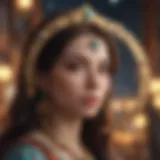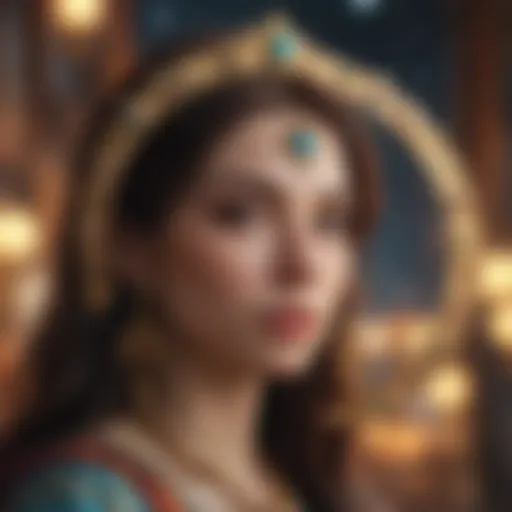Exploring Relationship Tarot Questions: Insights and Interpretations
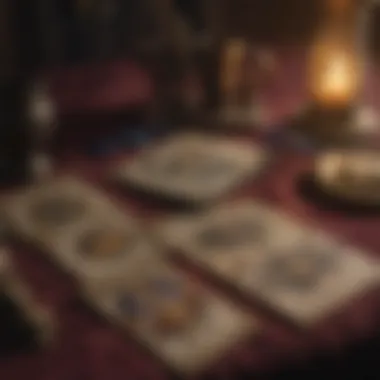

Intro
Tarot has emerged as a powerful tool for self-reflection and understanding personal relationships. Through various Relationship Tarot questions, individuals aim to gain insights into the dynamics of their interactions with significant others, family, and friends. This article aims to explore significant inquiries that can be posed within this context, highlighting methods and interpretations.
Understanding how Tarot can be beneficial in exploring personal relationships is key. Each card offers a unique perspective, prompting introspection and enhancing awareness. For those curious about the potential of Tarot in relationships, this article serves as a guide to harness this ancient practice.
Characteristics of Each Zodiac Sign
Astrology and Tarot complement each other effectively, particularly when investigating relational themes. Each Zodiac sign carries its own set of characteristics that can greatly influence how individuals relate to others. Understanding these can provide deeper insights into interpersonal connections.
Overview of Personality Traits
Each sign displays specific traits that shape their approach to relationships. For example, an Aries may exhibit a strong sense of independence and a bold nature, while a Cancer is often nurturing and sensitive. Knowing these traits helps in comprehending personal interactions.
Strengths and Weaknesses
From emotional intuitiveness of Water signs to the practicality of Earth signs, strengths and weaknesses vary. For instance, Sparkiness is a trait found in most Fire signs, yet they may struggle with impulsive actions. Recognizing these opposites might lead to more harmonious relationships.
Compatibility with Other Signs
Compatibility plays a crucial role in relationships. For example, Fire signs typically forge strong bonds with Air signs, while Earth signs may find harmony with Water signs. By utilizing Tarot within an astrological context, individuals can gain greater clarity on their relational compatibility.
"The beauty of Tarot lies in its ability to reflect inner truths, aiding exploration of both self and others."
How to Interpret Tarot Cards
Effective Tarot reading requires an understanding of the cards, particularly when focusing on relationships. Specific methodologies can enhance interpretation outcomes.
Major and Minor Arcana
The Tarot deck is split between Major Arcana, which signifies significant life themes, and Minor Arcana, often addressing day-to-day experiences. Depending on the context of relational inquiries, both can provide valuable insights.
Meaning of Key Cards
Certain cards resonate profoundly when it comes to relationships:
- The Lovers: Reflects choices in love and partnerships.
- Two of Cups: Indicates mutual attraction and emotional connections.
- Ten of Swords: Suggests possible endings or conflicts that need resolution.
Sample Interpretations in Different Spreads
Using different spreads can provide varying insights. For instance, a three-card spread might explore past, present, and future dynamics in a relationship. Additional spreads, such as the Celtic Cross, can elaborate further into relational complexities.
Overview of Deck Styles
Different Tarot decks can offer distinct energies and insights. Some renowned decks include the Rider-Waite-Smith, Thoth Tarot, and The Wild Unknown. Each deck has unique illustrations and symbolism, influencing interpretation.
Popular Decks and Their Unique Features
- Rider-Waite-Smith: Best known for its imagery that gives intuitive insights.
- Thoth Tarot: Rich in symbolism, it tends to attract esoteric-focused readers.
- The Wild Unknown: Naturalistic themes offer contemporary interpretations.
As this article unfolds, it will guide readers through how to formulate effective Relationship Tarot questions, interpreting the answers, and the significance of Tarot readings in navigating the complexities of human interactions.
Understanding Tarot and Relationships
Understanding Tarot in the context of personal relationships brings significant insights and clarity. Tarot serves not just as a divination tool but also as a means of reflection and exploration of deep emotional connections. For many, relationships are complex and layered, encompassing various dynamics that can benefit from introspection. Utilizing Tarot can illuminate pathways to better understanding oneself and others in these relationships.
When we talk about Tarot and relationships, we focus on how Tarot can enhance interpersonal connections and provide guidance. It encourages individuals to ask profound questions about their relationships, identity, and emotional responses. Engaging with Tarot opens doors to conversations that may not happen otherwise, bridging gaps in communication and enhancing emotional awareness.
Definition of Tarot
Tarot consists of a deck of 78 cards, divided into the Major Arcana and Minor Arcana. Each card holds its own symbolism and meaning. The Major Arcana features 22 cards representing significant life themes and lessons, while the Minor Arcana contains 56 cards that detail day-to-day experiences and challenges.
Through various spreads and interpretations, Tarot readers can gain insights that are often not immediately visible. It also fosters a connection to the intuitive self, allowing for a more personalized reading. This tool of divination encourages the querent to tap into their own psyche and bring forth questions about their relationship, both with themselves and others.
The Role of Tarot in Personal Relationships
In personal relationships, Tarot acts as a reflective surface, showcasing the dynamics at play between individuals. By asking specific questions, one can explore hidden motives, anxieties, and hopes related to loved ones. The cards can reveal patterns and tendencies that might otherwise go unnoticed in daily interactions.
Moreover, Tarot provides an avenue for self-discovery. It can assist individuals in understanding their own emotional responses to situations, thus promoting personal growth. Through Tarot readings, one may uncover strategies to improve communication and strengthen ties with partners, friends, or family members. This clarity can lead to more informed decisions and a healthier relational environment.
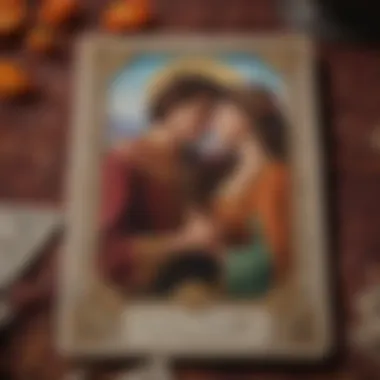

"Tarot is not just about predicting the future; it's about understanding the present and reflecting on the past to transform relationships for the better."
Types of Relationship Tarot Questions
The realm of Relationship Tarot questions serves as a pivotal aspect of Tarot readings, especially for individuals seeking clarity in their interpersonal connections. This section highlights the importance of formulating specific types of questions that can guide the reading process. Types of Relationship Tarot questions help to delineate various aspects of relationships, whether romantic, platonic, or familial. Each category addresses unique concerns, facilitating deeper insights.
By understanding how to frame these questions, the query becomes more tailored and focused, thus making the Tarot reading more impactful and relevant. Framing effective questions allows individuals to explore their thoughts and emotions, gaining clarity about their situation. This structured approach helps in illuminating potential outcomes and challenges that may otherwise remain obscured. With this framework, readers can navigate the complexity of relationships more adeptly.
Questions About Romantic Relationships
Romantic relationships often carry a blend of passion and complexity. Questions in this category can revolve around themes such as compatibility, emotional blocks, or future prospects. When individuals inquire about their romantic relationships, they may ask:
- What are the strengths of our connection?
This question seeks to understand the positive aspects that can be nurtured. - What challenges should we prepare for?
This inquiry aims to surface potential hurdles that may need addressing. - How can we improve our emotional intimacy?
Improving emotional bonds is often the goal of such questions, fostering a deeper connection.
These questions allow the Tarot cards to reveal insights about the dynamics at play, providing valuable guidance.
Questions About Friendships
Friendship dynamics, while often less intense than romantic entanglements, are significant in shaping overall well-being. Questions pertaining to friendships can cover trust, communication, and boundaries. A few examples include:
- How can I strengthen this friendship?
This seeks guidance on how to solidify existing friendships. - Are there underlying issues in this relationship?
This question helps identify potential conflicts. - What role do I play in this friendship?
Reflecting on individual contributions can lead to deeper understanding.
Friendship Tarot questions permit insights into how relationships can grow and evolve, emphasizing collective support.
Questions About Family Dynamics
Family ties can be intricate and multifaceted. Questions in this domain often center around roles, responsibilities, and unresolved issues. Some common inquiries include:
- What can I learn from my family relationships?
This question opens up exploration into family legacies. - What role do I play in family conflicts?
Understanding one's role can lead to greater compassion. - How can we enhance our family communication?
This aims to inspire dialogue, fostering healthier interactions.
Family dynamics can shift, and Tarot provides tools to understand these changes, facilitating healing and growth.
"Framing targeted Relationship Tarot questions is essential for unlocking depths of understanding and clarity in various interpersonal dynamics."
Crafting Effective Relationship Tarot Questions
Crafting effective Relationship Tarot questions is essential for unlocking deeper insights into the dynamics of personal connections. Questions provide a foundation upon which tarot readings can be situated. Without clear and focused inquiries, the reading can lack direction, leading to ambiguous results. To maximize the value of a tarot session, one must engage in thoughtful reflection about what they truly seek to understand. This can not only improve the clarity of the reading but also enhance one’s emotional and psychological processing.
Defining Your Intent
Before any tarot session, it is vital to define your intent. This means articulating what you wish to learn or explore regarding your relationships. Intent serves as a guiding star in the tarot journey, shaping the questions posed and ensuring that the reading aligns with your desires and concerns.
Consider the following factors when defining your intent:
- Personal Reflection: Assess your current situation, emotions, and what aspects of your relationships feel uncertain or troubling.
- Specificity: Vague questions often lead to broad and unfocused answers. Aim for specificity in your inquiries. For instance, instead of asking "What about my relationship?" consider asking "What can I do to strengthen my communication with my partner?"
- Openness to Discovery: Be prepared to face truths, whether enjoyable or challenging. An open heart and mind enable the tarot to reveal insights that might otherwise remain hidden.
- Utilize Emotion: Incorporate your feelings into the questions. Being emotionally connected can deepen the tarot’s impact in conveying messages relevant to your life's emotional tapestry.
Ultimately, defining intent establishes a framework that allows for meaningful engagement with the tarot cards, encouraging a holistic understanding of the relationship in question.
Examples of Open-Ended Questions
Open-ended questions foster a dialogue between the querent and the tarot. They invite exploration and invite the cards to provide nuanced answers that cater to curiosity and emotional depth. Here are some examples of open-ended questions suitable for exploring relationships with tarot:
- How can I nurture my relationship?
- What lessons can I learn from my past romantic experiences?
- In what ways might my fears affect my current relationship?
- What qualities should I focus on developing to enhance my friendships?
- How can I effectively manage conflicts within my family?
These questions not only allow for detailed insights but also encourage self-reflection and personal growth. They draw upon the tarot’s potential for illumination and understanding, providing the querent with practical tools for personal improvement and deeper relationship awareness.
The key to effective tarot readings lies in the quality of the questions asked.
By concentrating on crafting well-defined, open-ended inquiries, you prepare the groundwork for a fruitful tarot session that can lead to transformative insights.
Common Relationship Tarot Questions
In the realm of Tarot, asking the right questions is crucial for uncovering deeper insights into personal relationships. Common Relationship Tarot Questions form a foundation for understanding dynamics between partners, friends, and family. These inquiries encourage introspection by focusing on strengths, challenges, and future possibilities. Here, we explore a selection of these common questions that can provide clarity and direction. Such clarity is essential, as it helps individuals recognize patterns and potential areas of growth within their relationships.
What Are the Strengths of My Relationship?
Identifying the strengths in a relationship can be incredibly affirming. This Tarot question allows individuals to acknowledge positive aspects that may often be overlooked. Drawing cards in answer to this inquiry can highlight qualities such as trust, respect, and emotional support.
Moreover, focusing on strengths can serve to reinforce the sense of connection and partnership. By recognizing these traits, individuals can cultivate a deeper appreciation for their relationships. This understanding is not just beneficial for romantic couples but also applies to friendships and family ties as well. It is a reminder of what works and what can be nurtured further.
What Challenges Should Be Aware Of?
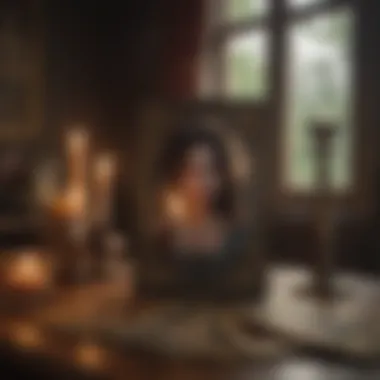

Challenges are inevitable in relationships. This question aims to bring awareness to issues that may be lurking beneath the surface. Tarot can unveil hidden difficulties related to communication, unresolved conflicts, or unmet needs. By addressing these challenges, individuals can take proactive steps to mitigate potential issues.
Drawing from the deck can provide enlightening perspectives on how to approach these situations. Sometimes the cards may reveal insights into emotional barriers or patterns that continuously emerge. Understanding these challenges is a stepping stone toward creating healthier interactions, ultimately benefiting all parties involved.
How Can Improve Communication?
Effective communication is the cornerstone of any successful relationship. This inquiry focuses on assessing current communication styles and identifying areas for improvement. Tarot can offer guidance on how to express feelings and thoughts more clearly and constructively.
For instance, the cards might indicate the need for active listening or encourage vulnerability. This reflection might lead to implementing changes in communication approaches that foster understanding and clear dialogue. Elevating communication not only strengthens connections but also diminishes misunderstandings that often lead to conflict.
What Is the Future Direction of This Relationship?
Considering the future can be daunting, yet it is a valuable perspective. This question asks Tarot to shed light on what lies ahead for the relationship in question. It can reveal possibilities of growth, challenges that may arise, and overall progress.
When exploring future potentials, the cards can provide directions to take or additional questions to ponder. This can clarify whether the relationship is aligned with both parties' goals and aspirations. Understanding the future trajectory can help individuals prepare for changes and embrace the evolution of their relationship.
"The best way to predict your future is to create it." – Abraham Lincoln.
Through thoughtful exploration of these common questions, Tarot serves as a guide for those seeking to deepen their understanding of their relationships. Each question unveils different layers of insight, enhancing one's ability to navigate personal connections with wisdom.
Interpreting Tarot Cards in Relationship Contexts
Understanding how to interpret Tarot cards within the context of relationships is essential for gaining insights. This section emphasizes the nuances that Tarot cards bring to human connections. Each card acts not only as a symbol but also as a mirror reflecting the dynamics, emotions, and potential outcomes present in one’s relationships. When conducting a reading, these interpretations can guide individuals toward deeper self-awareness and understanding of their interactions with others.
The Tarot is rich with layers of meaning. Proper interpretation can uncover underlying issues or strengths in relationships. The reader must consider the question at hand, the positions of the cards, and how they relate to each other. This understanding helps illuminate patterns that might not be immediately clear.
Several factors come into play when interpreting these cards, such as the symbolism and the surrounding context of the reading. The insights drawn from the cards can serve as prompts for reflection, enhancing one’s emotional intelligence and relational awareness.
"Tarot reading transcends mere fortune-telling; it is an invitation for self-exploration and increased understanding in relationships."
Major Arcana Cards and Their Meanings in Relationships
The Major Arcana consist of 22 cards, representing significant life themes and lessons. Each card can have profound implications for relationships. For instance, The Lovers card symbolizes deep connections and choices related to love. Its appearance can suggest the need for open communication and understanding in romantic relationships or even signify a pivotal choice that might alter the course of a partnership.
The Empress stands for nurturing and abundance, indicating a period of growth and harmony. This card can symbolize a stable and loving relationship, where emotional support is being offered.
However, cards like The Tower may indicate upheaval or dramatic changes in a relationship. This card serves as a warning of possible conflict or significant shifts that could challenge the status quo. It emphasizes the importance of being prepared to face and address underlying issues within a relationship.
Minor Arcana Cards and Their Relationship Implications
The Minor Arcana consist of 56 cards, divided into four suits: Cups, Pentacles, Swords, and Wands. Each suit brings its own unique aspects to relationship readings.
Cups, generally associated with emotions and relationships, can tell a lot about love and interpersonal connections. For example, a card like Two of Cups signifies emotional bonds and partnership. It represents mutual affection and can indicate that a relationship is at a pivotal balance point.
Swords, on the other hand, relate to thoughts and conflict. A card such as Five of Swords could indicate discord or misunderstanding. This card might encourage the querent to address miscommunications or confrontational dynamics within their relationships.
Wands represent passion and creativity. The Three of Wands can indicate a period of foresight and planning, suggesting that it may be time to consider future directions in a relationship.
Pentacles are tied to the material aspects of life. The Four of Pentacles might suggest concerns about security and stability. This card could indicate issues of control or caution in personal interactions.
In sum, interpreting these cards within relationship contexts allows for an understanding of both the emotional and practical elements involved in interpersonal dynamics. Through careful analysis, one can derive valuable lessons, fostering personal growth and healing.
Practical Tips for Conducting Relationship Tarot Readings
Conducting tarot readings focused on relationships requires a thoughtful approach. The environment, choice of deck, and the role of intuition all contribute significantly to the experience. This section provides practical tips that can enhance your reading sessions, making them more insightful and meaningful.
Setting the Right Environment
Creating an appropriate environment for tarot readings is essential. A calm, quiet, and comfortable space allows both the reader and querent to relax. This space should be free from distractions, where conversations can flow freely. Consider using soft lighting, perhaps candles or dim lamps, to create a serene atmosphere. The presence of soothing music or incense may also enhance the experience but should not overpower.
Prepare your space beforehand. A clean and organized area can help set the intention for the reading. Some practitioners suggest laying down a cloth that resonates with the purpose of the reading. A dedicated space does not only foster focus but respects the practice itself. This mindful preparation can elevate a simple reading to a sacred ritual.
Choosing the Right Deck
Selecting the right tarot deck is a personal choice that can influence your readings. Each deck contains unique artwork and symbolism, which may resonate differently with individuals. Popular decks like the Rider-Waite Tarot or the Thoth Tarot have well-established meanings and interpretations, making them accessible for many users. However, there are many other decks available that might speak more deeply to specific relationships or emotions.
When choosing a deck, consider your own relationship with it. Do the images evoke clarity or confusion? Does the symbolism register with your understanding of relationships? It might be worthwhile to handle decks in person or peruse images online. Ultimately, ensure that your selection feels intuitive and right. A well-chosen deck can enhance your ability to draw deeper insights during readings.
The Importance of Intuition in Readings
Intuition plays a central role in tarot readings, especially those concentrated on relationships. This aspect transcends mere card meanings; it encompasses the deeper understanding that can arise during a reading. As you shuffle the cards and lay them down, allow yourself to be guided by instincts. While fundamental knowledge of card imagery helps, trust your feelings on what a particular card might imply in the context of a relationship.
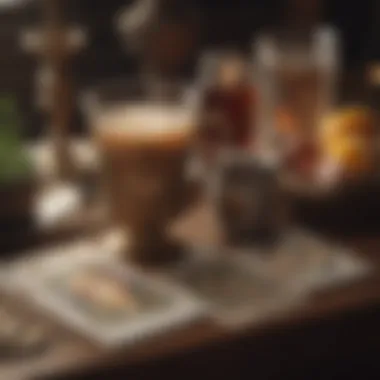

Every reading is an interplay of the known meanings and the personal intuitions of the reader. Engaging with the cards actively on an emotional level often yields profound insights. Consider keeping a journal to document your feelings and interpretations over time. Through this practice, you may notice patterns that deepen your understanding of both tarot and personal relationships.
"Tarot is not just about interpretation; it is also about your ability to connect with the cards beyond surface meanings."
Ethics of Using Tarot in Relationships
Ethics plays a crucial role when it comes to conducting Tarot readings, especially within the context of personal relationships. As Tarot can reveal sensitive insights, understanding the ethical implications helps ensure that the practice is respectful and responsible. The nuances of ethics in Tarot not only protect the querent’s emotions but also uphold the integrity of the practitioner.
In the realm of relationships, ethical considerations promote trust and confidentiality. When individuals seek guidance from Tarot regarding their interactions, they usually share vulnerable aspects of their lives. Hence, it becomes imperative to approach such readings with a solid ethical framework. This includes maintaining privacy and respecting the autonomy of those involved in the querent's inquiries.
Emphasizing ethics in Tarot ensures that practitioners remain conscious of the boundaries and emotional landscapes they navigate. It cultivates an environment where clients feel safe to explore their feelings without fear of judgment. Ultimately, being ethically proficient enriches the reader’s skills and enhances the overall experience.
Confidentiality and Privacy
Confidentiality stands as a foundational principle in the ethical practice of Tarot. When clients confide in a practitioner, they place their trust in that individual. This trust involves sharing personal, sometimes sensitive details that may include relational conflicts, insecurities, or fears. Breaching this confidentiality can not only damage relationships but also tarnish the reputation of the Tarot community.
Practitioners should be transparent about how they handle such information. It might be helpful to establish ground rules before a reading begins. Clear communication fosters an atmosphere of trust. For example, ensure that information divulged during a session is not shared with others, including mutual acquaintances or online platforms.
Maintaining privacy goes beyond just verbal assurances. Practitioners must also be careful about how they share their experiences. When discussing past readings, it is crucial to alter identifying details so that no one can trace back to the individual involved. This responsibility not only protects the querent but also preserves the sanctity of the Tarot as a tool for personal growth and healing.
"Respect for confidentiality forms the bedrock of the Tarot practitioner's ethical duty."
Respecting the Free Will of Others
In Tarot readings related to relationships, respecting the free will of others is vital. The insights gleaned from the cards can provide clarity and direction. However, they should never dictate how someone should act or what choices they should make. Each person possesses the right to direct their own life and make decisions based on their feelings and circumstances.
Practitioners must encourage clients to reflect on the insights derived from their readings, facilitating understanding rather than imposing preordained outcomes. Emphasizing personal agency allows individuals to integrate their own values and beliefs into their decisions, which can lead to more authentic outcomes in their relationships.
Additionally, when clients inquire about the thoughts or actions of others in their lives, practitioners should guide the conversation carefully. Instead of predicting outcomes or defining others' feelings, reading must focus on exploring the querent's role within that dynamic. This approach honors the autonomy of all parties involved and creates a more ethical reading experience.
By nurturing a practice rooted in ethics, Tarot can serve as a viable tool for self-exploration and understanding in relationships. \n\n
The Impact of Tarot on Relationship Understanding
Understanding the nuances of personal relationships is a challenging endeavor. The use of Tarot in this context can provide insights that enhance comprehension and awareness. Tarot does not merely predict outcomes; it acts as a mirror reflecting our internal states and relationship dynamics. This method can assist individuals in uncovering hidden motives or feelings that may otherwise remain obscured.
The significance of Tarot in relationship understanding lies in its ability to facilitate self-exploration. When one engages with Tarot, it prompts questions about emotions, behaviors, and relational patterns. This process can lead to crucial realizations about oneself and others. Equipped with these insights, individuals can navigate their relationships with greater clarity and intention.
Moreover, Tarot can serve as a conversation starter. Engaging with a partner about card meanings and interpretations can foster communication, allowing both parties to articulate thoughts and feelings more freely. This shared experience often deepens the emotional connection, thus enriching the relationship.
"Tarot opens avenues for dialogue that may otherwise be difficult to approach, enabling couples to navigate complex emotional landscapes together."
Self-Reflection Through Tarot
Self-reflection is a cornerstone of personal growth. Tarot encourages individuals to confront their emotional landscapes head-on. Each card carries layers of meaning that resonate differently based on one’s current circumstances. Reflecting on a card drawn during a reading can spark profound introspection.
For instance, drawing The Lovers card may prompt questions about one’s values in relationships or decisions impacting love life. This card encourages individuals to contemplate harmony and mutual respect in their partnerships. Through this lens, Tarot becomes a catalyst for assessing personal beliefs and relationship needs.
The reflective practice of engaging with Tarot can result in heightened self-awareness. By examining feelings and reactions, individuals may gain insights into recurring patterns in relationships. Understanding these patterns serves as a guide for improving future interactions.
Enhancing Emotional Intelligence with Tarot Insights
Emotional intelligence encompasses the ability to recognize, understand, and manage emotions. Engaging with Tarot readings can significantly bolster this skill. Tarot prompts exploration of emotional reactions and interpersonal dynamics, leading to a deeper understanding of oneself and others.
For instance, when a card representing conflict arises, such as Five of Wands, it can lead individuals to reconsider how they handle disagreements. This acknowledgment can enhance the ability to approach conflicts with empathy and patience.
Additionally, Tarot insights help individuals recognize their emotional triggers. By identifying what specific cards resonate during readings, one can better understand how to respond to similar situations in reality.
Concluding Thoughts on Relationship Tarot Questions
The exploration of Relationship Tarot questions provides a vital framework for understanding personal dynamics. This topic emphasizes how Tarot can serve as a catalyst for self-reflection and growth in relationships. Recognizing the intricate layers of interpersonal connections is essential in today's complex social fabric.
Through the lens of Tarot, individuals can analyze their relationships, assess their strengths, and identify areas that may require attention. By addressing essential questions, one not only attains clarity but also better emotional awareness.
Engaging with Tarot in this context allows for deeper insight into various types of relationships, whether romantic, familial, or platonic. This practice can illuminate the subconscious patterns that may hinder or enhance relational dynamics. Thus, the significance of Relationship Tarot questions becomes increasingly clear as one embraces this method of introspection.
The Ever-Evolving Nature of Relationships
Relationships are inherently fluid, often shaped by external circumstances and internal changes. Individuals grow, evolve, and change their perspectives over time, which can dramatically influence their connections with others. Thus, using Tarot to address these changes can foster a more comprehensive understanding of oneself and one's partner.
Embracing this evolution allows individuals to proactively manage the complexities of human interaction. Tarot can help reveal underlying issues, facilitating proactive communication and problem-solving. Keeping an open mind towards personal growth makes relationships more adaptable.
Encouraging Continuous Exploration
The journey of understanding through Tarot is ongoing. Each reading can lead to new discoveries and insights that challenge preconceived notions and affirm one's path. Continuously engaging with Relationship Tarot questions fosters a sustained dialogue with oneself and others.
Encouraging this exploration is vital in cultivating emotional intelligence. The dynamic nature of life means that relationships will always present new lessons and experiences. Each question posed to the Tarot can empower individuals, inviting them to delve deeper into their emotional landscape.
